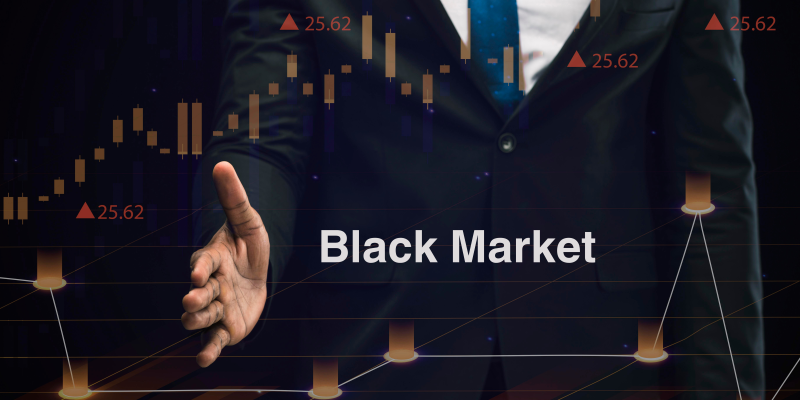The Black Market is defined as trading in violation of publicly enforced regulations such as rationing laws, laws banning specific items, and official currency exchange rates. Rationing is common during wartime to equalize the sharing of goods and services in short supply. Black-market activity may include charging higher than legal prices, theft or forging ration currency, and making additional payments to obtain a given amount of merchandise.
Black market activity in foreign exchange is common in nations where convertible foreign exchange is scarce and foreign exchange is tightly controlled. The illegal market frequently sets foreign exchange prices that are several times higher than the official ones. Weapons, illegal substances, unusual and protected animal species, and human organs required for transplant surgery are all examples of items sold on the black market. Children have been trafficked and sold on the black market as part of sex slavery. Even forbidden cheeses, such as casu marzu (which is considered harmful due to the presence of live maggots), are exchanged. Many of these “goods” are offered and sold on the “dark web,” where anonymous browsers like Tor facilitate covert, encrypted transactions.
A black market is a marketplace or system of commerce that violates official government restrictions. The term “underground economy” refers to economic transactions that are illegal or non-compliant with a system of norms or laws. A black market differs from a grey market, which is the legal exchange of goods through unofficial or unlawful channels.
The Max Planck Institute for the Study of Societies (MPIfG) launched research into the industry in 2012. Jens Beckert, the director, organized a team of experts and academics to determine the tough lines that distinguish the black market. The numerous stages of production, distribution, and consumption are difficult to track and may not be strictly unlawful when compared to people trafficking or the drug trade.
The researchers investigated the unlawful dealing of rhinoceros horns, the diamond trade that originated in Sierra Leone, the growing counterfeit industry based out of Argentina, and white-collar crimes that take place in the financial markets.
Key points:
- A system that works in an area where rules or laws are broken is known as a black market. It’s a form of commerce that operates outside the boundaries of authorized channels.
- It is illegal since it does not adhere to established guidelines.
- In this case, trade circumvents legal taxes and other regulations imposed by the government, and the money that is made can be referred to as “black money.”
How It Works
The sheer size of the black market is of significant social and economic importance, according to Jens Beckert, head of the Max Planck Institute for the Study of Societies (MPIfG). Indirectly, researching such a system increases comprehension of the legal markets. The relationships amongst players in the black market form an ecosystem that extends beyond the reach of legal action in the event of a dispute, having a significant impact on the day-to-day operations of the market.
The ideal system is a personal network, which is based almost entirely on trust. It is challenging for black market companies to grow as a result. In addition, Beckert’s study examined how business partners collaborate in the illicit market where there is no official government integrity or legal protection.
The study also shed light on the blurry lines that separate legitimate and illicit market activities, particularly when it comes to financial or white-collar crimes. Illegal activity can occur without being seen or prosecuted within the bounds of fully lawful market mechanisms.
Symbiotic Relationship between Legal and Black Market
Legal bans can occasionally result in the formation of a black market, making it difficult to abolish. According to a Stanford University study titled “Forbidden Transactions and Black Markets” by Chenlin Gu, Alvin E Roth, and Qingyun Wu, legal marketplaces attract participants by attempting to make the market safe and reliable.
The concept of penalization functions as a disincentive to illegal activity in the black market. However, such legal sanctions are not always substantial and cause little social stigma, thus they do not deter participation in the underground market.
As unlawful trading grows in volume, more individuals are able to continue trading while avoiding legal penalties. As a result, if illegal markets persist for an extended length of time, they become more difficult to destroy. Although governments can alter the extent of aversion toward the black market by public education and continuous public relations, this is often difficult.
According to a National Bureau of Economic Research research, the black market accounts for nearly one-fifth of all worldwide economic activity. Solomon Hsiang and Nitin Sekar, authors of “Does Legalization Reduce Black Market Activity?” Evidence from a worldwide Ivory Experiment and Elephant Poaching Data” assesses the first-ever worldwide legalization experiment conducted in an internationally prohibited market. The findings are unexpected.
Read more: A Closer Look at Grok: Elon Musk’s ChatGPT Competitor
They show a 66% surge in the illegal ivory trade following the news that ivory sales would be legalized. Further investigation of various black market data suggests that an increase in elephant poaching was associated with the legal sale. The authors demonstrate that partial legalization of forbidden commodities has no influence on black market activities.





